The Financial Advisor’s Guide to Keyword Research
Justine Young
Senior Content Writer
Search
Subscribe
Keyword research is an essential part of every marketer’s toolbox – they’re the, well, key to ensuring your website is correctly crawled and indexed by search engines.
And with literally hundreds of thousands of financial advisors in the United States alone, it’s well worth the investment to put your firm on the digital map.
Newsletter Sign up
"*" indicates required fields
That’s why we’re talking keywords in part two of our digital marketing series on SEO. If you haven’t read our first blog post on how to conduct a content audit, we recommend you start there to get a better idea of the basics of SEO.
Whether you’re diving in without any prior keyphrase experience or just looking to round out your expertise, we’ve got you covered with our complete guide to keywords for financial advisors – let’s get started.
What is Keyword Research?
Keyword research (also known as keyphrase research) is the process of finding terms that your ideal personas are searching for on a regular basis, and then using those terms organically in your digital marketing and website copy. It’s all about asking the right questions: What do I offer my clients? What questions do they have that could lead them to my product or service?

What are Long Tail Keywords?
Even though we say “keyword,” we really mean keyphrase.
Your prospects might be searching for terms like “investing” or “finances,” but those keywords don’t give you a whole lot of indication that the person is looking to hire a financial advisor – they could just be exploring the basics.
Plus, single keywords tend to be much more popular and thus more difficult to compete with.
So what’s your best bet?
Long-tail keywords, or often called “keyphrases.” Taking a long-tail approach to your keyword research allows you to hone in on your personas while also giving your firm a better chance of appearing higher in search engine results.
For example, instead of focusing on the broad topic of “investing” as your keyword, you might see more traction with a long-tail keyword like “investing for early retirement” or “investing with ESG funds.”
Plus, just think about it: When was the last time you typed a single word into Google for a search? It’s just not the way people use search engines anymore.
Why is Keyword Research Important for Financial Advisors?
Beyond having the lowest acquisition cost of all advisor marketing strategies, keyword optimization has some other valuable benefits, such as:
-
Increase your firm’s website traffic, which in turn increases brand awareness
-
Offer a free or low-cost way to gain prospects
-
Deliver customer insights (i.e., what they are searching for, how they are searching, and why)
Still not convinced? Just take a look at the numbers: Backlinko’s 2022 SEO Statistics Report found that nearly 68% of all clicks on a search engine results page go to the top five organic results.
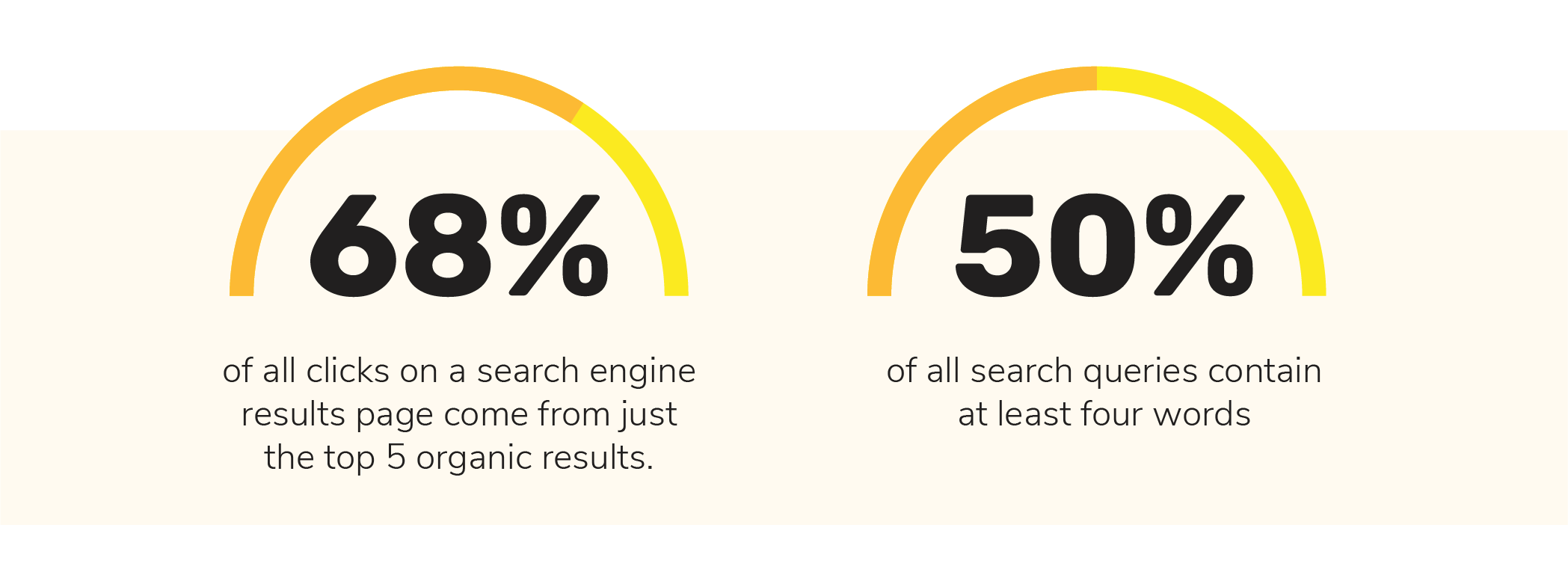
That same report found that half of all search queries contain at least four words. The takeaway? Your potential clients are most likely searching for answers to specific questions, and you might have an easier time reaching them through organic optimization rather than paid advertisements.
How to Conduct Keyword Research
Now that you know the “what” and the “why” of keyphrase research, it’s time to get started on the “how.”
Local vs. Content Keywords
You’ll want to include two basic categories of keyphrases in your research: local and content.
We’re calling this first category content keywords because they go in your blogs or other pieces of consumer content.
On the other hand, local keywords focus specifically on your geographical area and surrounding cities. These types of keyphrases can help you rank higher in Google for searches like “financial advisors near me.” For the best results, you should try to place your local keywords directly in your website copy, rather than in your content.
The mantra you need to remember? Local keywords are for web pages; content keywords are for blogs.
Get in the Head of Your Personas
Next, you’ll need to get a change of perspective. Consider what your personas, or ideal clients, would be searching for at different stages of the marketing funnel. Keep in mind that the vast majority of online searches come from the top of that funnel, which is where consumers search for informational and educational content – so that’s a great place to focus.

For example, if one of your personas is a middle-aged, career-driven woman in the Midwest, what would you expect her to search for that could lead to your services?
Perhaps she would be looking for information on long-term retirement planning advice, or wondering how inflation could impact the market in the next decade. It’s worth your while to spend some time brainstorming from this new perspective.
If you get stuck, consider what questions your current clients often ask – what led them to those questions in the first place?
Make a List
Put that brainstorming session to good use and make a list of all the keyphrases you can come up with, long-tail and otherwise.
To help you in this step, we’ve created a free, downloadable worksheet for making your list – along with several prompts to get your creative juices flowing.

Click here to download your free keyword list-making template
And leave that editor’s pen to the side for now – the goal here is to come up with as many keywords as possible.
Use Free Tools to Expand Your List
Once you’ve exhausted your own brain power, you can use one of several free online tools to expand your keyword list even further. Here are a few of our go-to sites for keyphrase exploration:
1. Ubersuggest
Neil Patel’s Ubersuggest tool is super helpful for keyword research. Without even making an account, you can input one of your keywords and the website will automatically deliver a bunch of useful information.
To find the keyword recommendations, simply scroll down on your results page. As a bonus, you’ll also see a list of content ideas that include your chosen keyword, giving you a wealth of ideas for your next blog post.
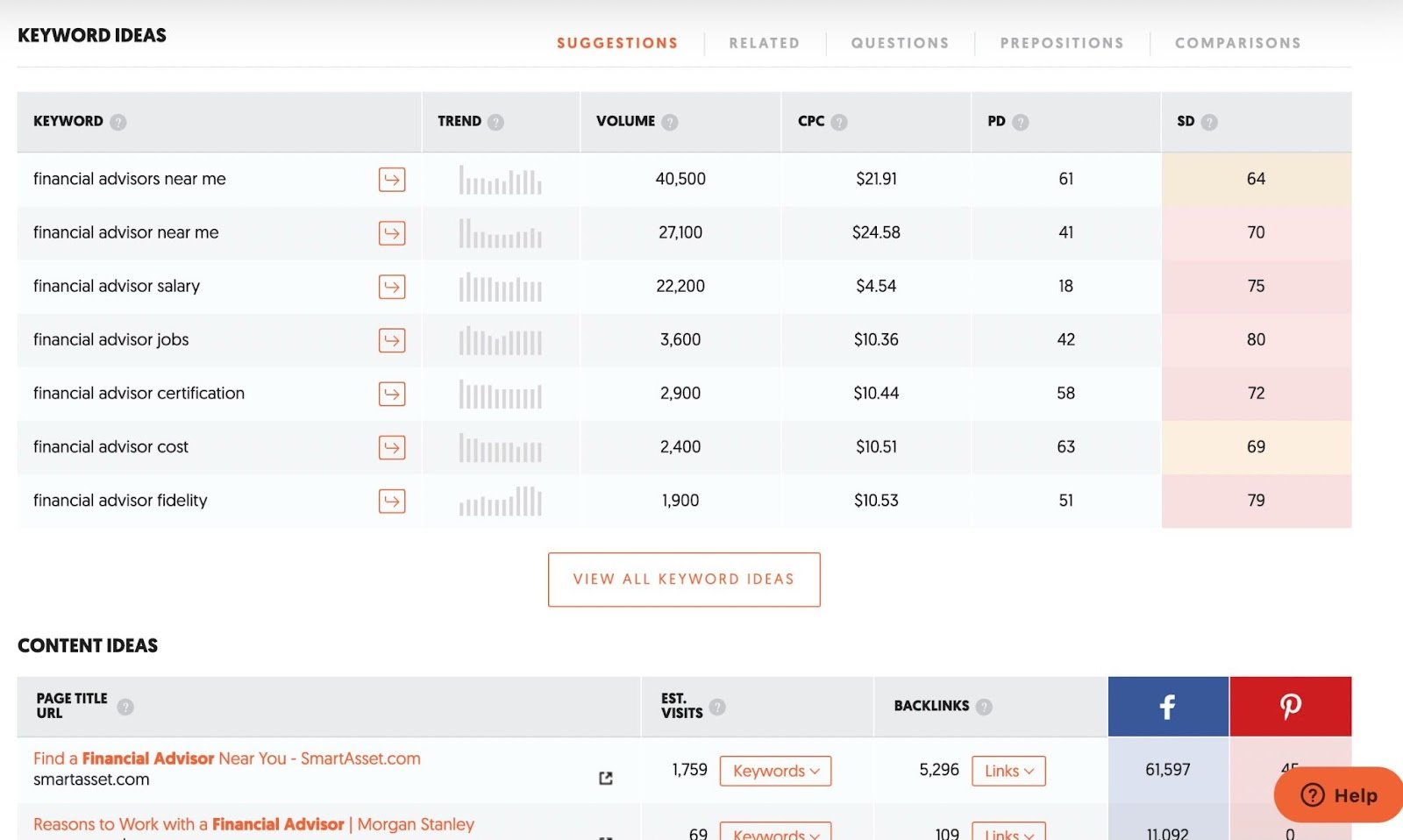
AnswerThePublic is another favorite here at Three Crowns, thanks to its use of real search questions and awesome visualizations, like when it breaks your keyword into a circle chart of questions people are asking on your chosen topic. You can also organize your results alphabetically, and even look at a list of related search terms.
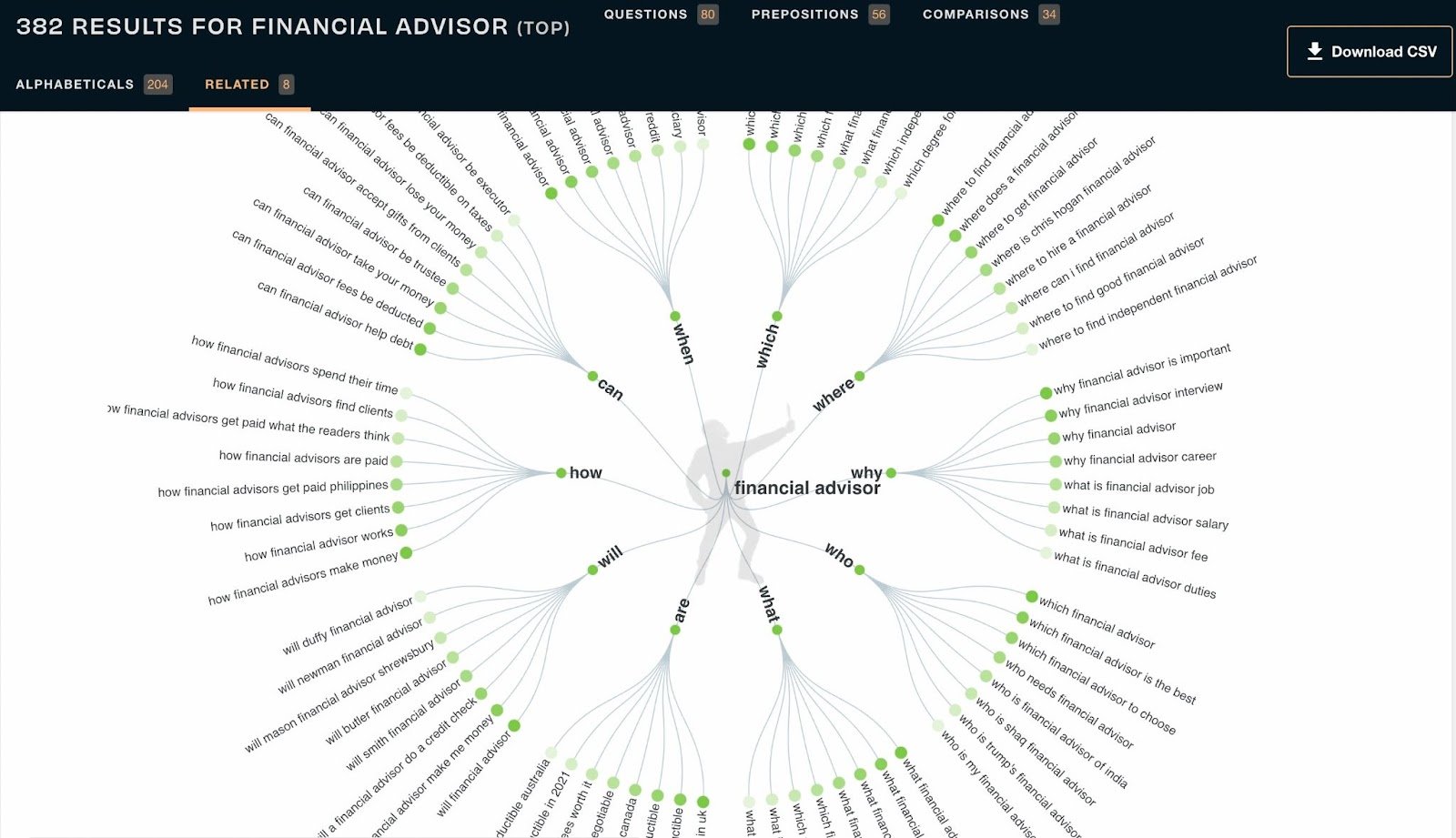
Note: While this tool is free, there is a cap on how many terms you can search per day.
Google’s Keyword Planner gives a simple and easy-to-use search tool. Once you’re on the site, you just hit “Discover new keywords,” enter one term from your list, and a spreadsheet will pop up with an entire list of additional keyword ideas.
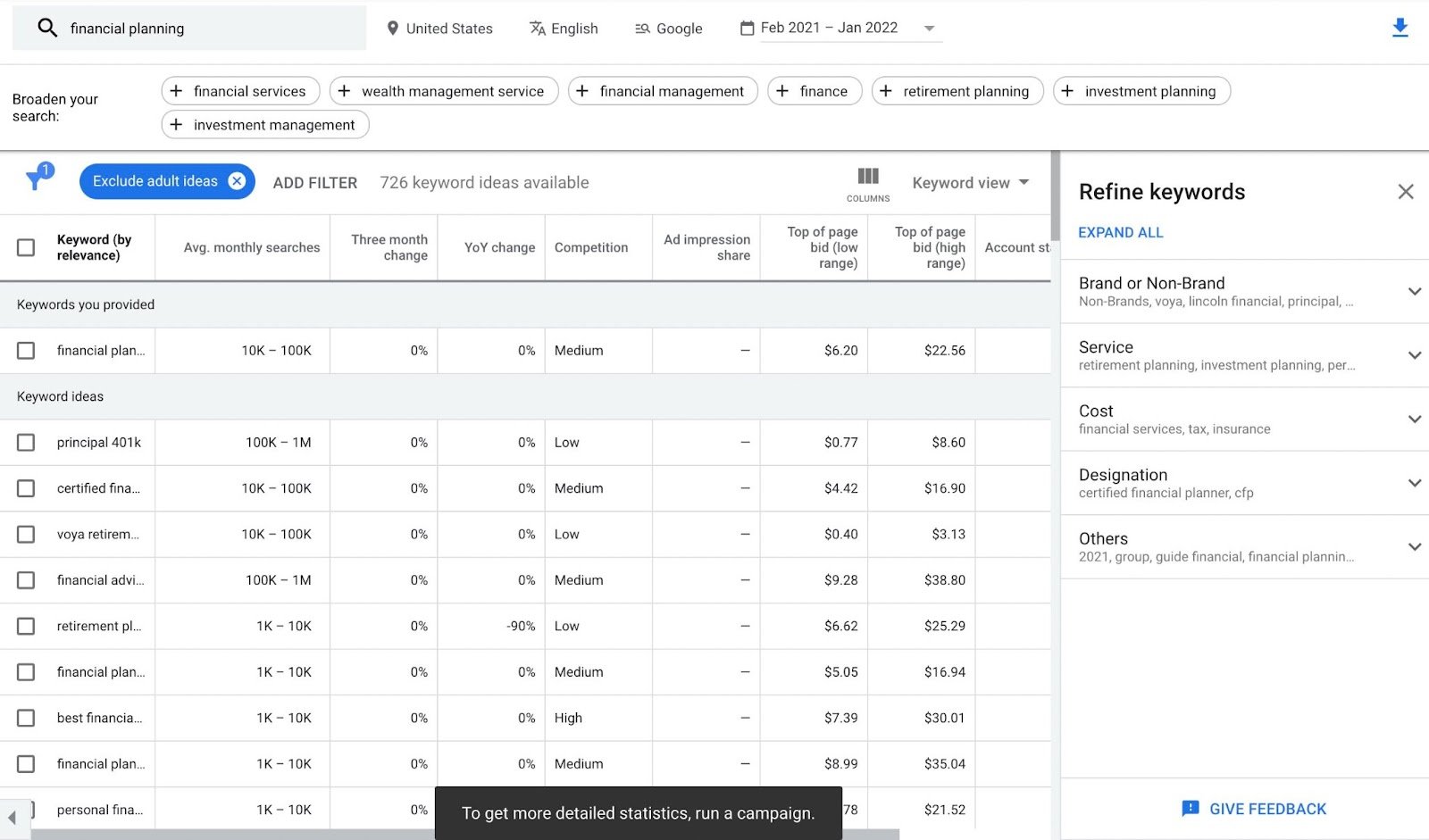
Another bonus? Keyword Planner also allows you to apply filters to your search to exclude certain keywords you know for sure you don’t want to use.
While Google’s Keyword Planner is built for running ad campaigns, you are not required to do so.
Determine Search Volume
According to Semrush, search volume is “the average number of times a certain keyword is searched each month.”
This type of information can help you decide between two similar keywords for a certain campaign – if you know your prospects are searching for one term significantly more than another, it might make the decision for you.
For example, a quick search on Google Keyword Planner shows that the term “financial planner” is searched somewhere between 10,000-100,000 times per month on average. In contrast, the keyword “investment planner” is only searched between 1,000-10,000 times per month.
Determining search volume can also help you decide whether a keyword is worth your time or not. Advisors can easily get caught up in the weeds with keyword research, but keeping an eye on search volume can help you know when you’re getting too specific. If no one is searching for it, then it’s probably not worth your time.
Consider External Factors
Your firm should also keep external factors in mind, especially in your quest for local keywords. Things like the season, region, holidays, or even big news events could impact what your prospective clients would be searching for.
For example, you would expect an uptick in searches for information on how to file tax returns in early spring as opposed to later in the year.
Refine Your List
Now that you have a lengthy list of terms, you can choose which would be best to use in your upcoming campaigns. Rather than trying to stuff every keyword into each campaign, you’re better off choosing a few focus keywords that connect directly to your campaign goals.

But don’t throw away that list! You can come back to it each quarter or campaign cycle and find a new variety of keywords to use.
I’ve Got My Keywords, Now What?
Google’s algorithm is pretty amazing at knowing what web pages are about, but they love it when you set things up in a way that makes it easier on them.
Search engines check several places in your website for keywords, including:
-
Headers and subheads
-
SEO titles
-
Meta descriptions
-
Body text
-
Alt text for images
You’ve done all the heavy lifting with your research, so don’t let it go to waste – spread your keywords out.
Avoid Keyword Stuffing
Keyword stuffing is when you insert a keyword into a blog a zillion times in the hopes that it will increase your search engine results placement (SERP).
While this might have worked back in the day, Google eventually caught onto the practice. Keyword stuffing can actually have the opposite effect of what you intended, lowering your page ranking and even getting your site removed from search results altogether.
How do you find that sweet spot in your content? Only use your keywords (or it’s synonyms) when it makes sense. If you feel overloaded while you’re reading the blog, chances are Google will also take notice.
5 Free and Low-Cost Keyword Optimization Tools
Want to delve even deeper into your keyword research and optimization? We’ve rounded up a list of five free and low-cost keyword optimization tools you can use to take your SEO to the next level.
The list includes: Yoast’s WordPress Plugin, the Moz Keyword Explorer, Ahrefs Keyword Explorer, Keyword Surfer, and GetKeywords.
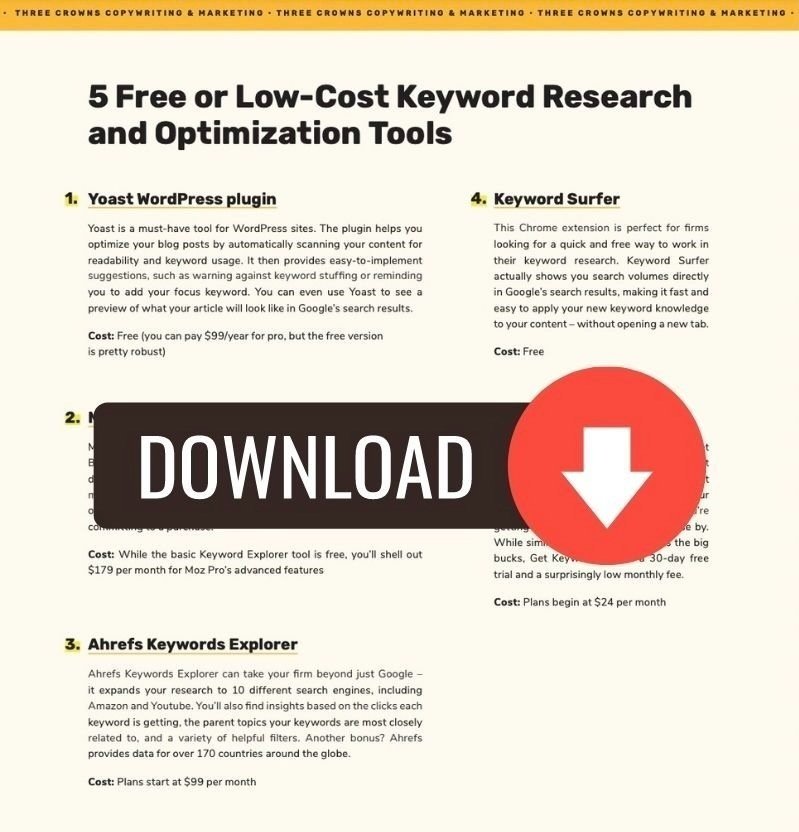
Click here to download your free copy of our top 5 keyword optimization tools.
With these simple tips and tricks to improve your SEO keyword research, your firm is well on its way to increased organic traffic and higher search results rankings.
Make the Most of Your Marketing with Three Crowns
Questions about keyword research? Need help jumpstarting your firm’s next marketing campaign? Click here to connect with Three Crowns Marketing today.
Newsletter Sign up
"*" indicates required fields